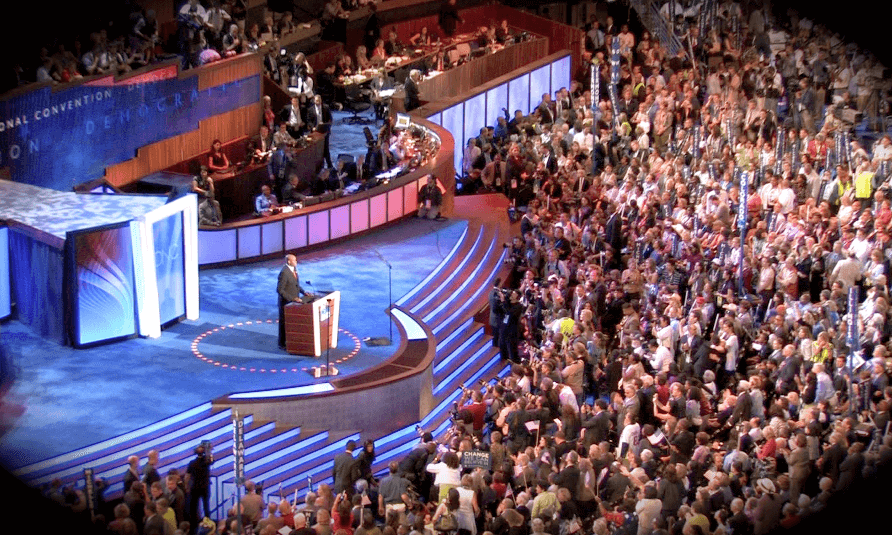
It looks like the debate on superdelegates may take central stage at the Democrats’ national convention in Philadelphia in July – not about how they vote, but how the delegates vote on them.
Bernie Sanders campaign is looking to use their delegate haul from the primaries and caucuses at the convention to push for significant changes to the nominating process, Buzzfeed reported last week. Chief among them: eliminating superdelegates.
I hope they’re successful. It’s always been a flawed idea in both theory and practice, and in both the 2008 and 2016 Democratic primary it’s caused needless distractions and consternation even though – in the end – they never really came into play.
It was disappointing to watch a platform debate over superdelegates at the 3rd District convention fall largely along Sanders-Clinton lines, with many Clinton people standing up to keep superdelegate roles the way they are. I myself caucused for Clinton, but don’t share what became the party line on the matter (which always seemed like more of a knee-jerk reaction to Sanders’ position, rather than a deeply-held belief of their own).
Let’s first go through the arguments for superdelegates, and why they don’t hold water.
Having superdelegates means activists don’t have to run against members of Congress for the national delegate position
Why not just have non-voting slots at the national convention for all the main elected officials in each state? A large part about going to the convention is the fun and prestige of it. It’s not like the Democratic Governor of a state can’t go if they don’t have an official vote to cast.
There also doesn’t seem to be any set rule on the total number of delegates either, so you could simply increase the number of delegates from each state. That way if those party leaders also wanted a vote at convention, it would be a bit easier for everyone to get there. But they would still have to run. I actually suspect this rule is more to protect those leaders from getting beat at district and state conventions, as I can think of a few Iowa superdelegates who might have trouble getting elected from the activists that show up to those things.
Superdelegates should have a vote thanks to their years of service in the party.
Yes, they should have a vote. The same as any other Democrat: one. In their primary or caucus. Their vote should not carry the same weight as tens of thousands of voters. That’s just basic fairness, and a party that emphasizes voting rights and equality should realize that. There’s plenty of other ways to give those leaders an important role in the national party and at the convention.
Superdelegates can save the party from an extreme nominee
Yeah, I bet the Republicans wish they had that this year. But consider what would happen if they did: Republican superdelegates – the elites of the party – swoop in at the convention and throw it to Ted Cruz or someone else, despite Trump’s significant lead in votes. The Trump voters might very well riot, or at least not vote for the Republican nominee.
It would be a disaster. Yes, Trump as the nominee is a disaster in and of itself, but you’d just be replacing it with a different type of disaster.
Bottom line: if your party has gone so far off the rails that you’re nominating someone so crazy that the party’s leaders have to step in and effectively overturn the will of the people, you’re pretty screwed anyway. May as well just let the person take over, crash the party in one election, and then use that as a cautionary tale to elect a more balanced nominee next time. Subverting the popular vote will likely just prolong the internal problem you’re having.
Those are some reasons why the current rationales for the superdelegate system is flawed, but there’s an even bigger reason to get rid of them: look how it plays out in reality.
If you step back and look at it, the existence of superdelegates has only hurt Clinton in this race in terms of messaging, as well as the party’s quest for unity. Earlier on in the race, when Sanders was still within striking distance of Clinton’s delegate haul, concern over the lopsided endorsements for Clinton from superdelegates caused many Sanders supporters to suggest “the establishment” would steal the race from the surging underdog.
This was actually a huge problem in 2008 when Clinton fell behind Barack Obama (as I wrote earlier this year). An entire month of cable news chatter surrounded Clinton’s actual plan to catch up to Obama with superdelegates, which came off just as poorly as the later Sanders effort this year.
Now you have the awkward situation where Clinton likely won’t get to 50%+1 in only pledged delegates. So the superdelegates will technically put her over the top. Yes, she has the clear lead in both pledged delegates and popular vote (she’s ahead by over 3 million), but it’s one extra talking point to keep the most boisterous Sanders supporters agitated about.
When you have unpledged superdelegates – who could in theory still change their mind up until the convention – you give false hope to supporters of a candidate in a close second place, thus dragging out the process even more. And you also got the situation this year where Sanders voters became furious with their local members of Congress and other superdelegates for siding with Clinton. It put those Democratic leaders in impossible situations where they were only going to aggravate a large chunk of their base either way.
And again, all of this consternation is for naught. Clinton will surely close out the primary process with many more actual votes and a majority of pledged delegates. So it’s not like the superdelegates needed to come to the rescue of their preferred candidate anyway. All their existence does is get everyone’s activists bogged down in process arguments instead of focusing on policy and the actual campaign.
Only in an extreme circumstance (where, again, the party would have bigger issues to deal with) would superdelegates ever vote en masse for one candidate to defeat the front-runner. The party should vote to move on from this counterproductive process at the national convention so that our next presidential contest doesn’t become so focused on such a pointless topic.
by Pat Rynard
Posted 5/16/16
Politics

Biden marks Earth Day by announcing $7 billion in solar grants
The Biden administration on Monday announced the recipients of its Solar For All Program, a $7 billion climate program that aims to lower energy...

6 terrifying things that could happen if the Comstock Act is used to target abortion
Does 1873 sound like a really, really long time ago? Well, that’s because it is—but if Republicans and far-right anti-abortion activists have their...
Local News

No more Kum & Go? New owner Maverik of Utah retiring famous brand
Will Kum & Go have come and gone by next year? One new report claims that's the plan by the store's new owners. The Iowa-based convenience store...

Here’s a recap of the biggest headlines Iowa celebs made In 2023
For these famous Iowans, 2023 was a year of controversy, career highlights, and full-circle moments. Here’s how 2023 went for the following Iowans:...





